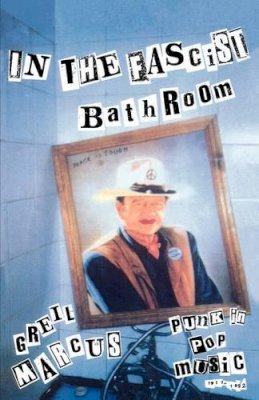
In the Fascist Bathroom: Punk in Pop Music, 1977-1992
Greil Marcus
Was punk just another moment in music history, a flash in time when a group of young rebels exploded in a fury of raw sound, outrageous styles, and in-your-face attitude? Greil Marcus, author of the renowned Lipstick Traces, delves into the after-life of punk as a much richer phenomenon—a form of artistic and social rebellion that continually erupts into popular culture.
In more than seventy short pieces written over fifteen years, he traces the uncompromising strands of punk from Johnny Rotten to Elvis Costello, Sonic Youth, even Bruce Springsteen. Marcus's unparalleled insight into present-day culture and brilliant ear for music bring punk's searing half-life into deep focus. Originally published in the U.S. as Ranters and Crowd Pleasers.
Product Details
About Greil Marcus
Reviews for In the Fascist Bathroom: Punk in Pop Music, 1977-1992
The Times
There isn't a bland sentence or obligatory opinion in this book. Brittle, lyrical, funny, outraged and for all the untouched bases, remarkably whole, [In the Fascist Bathroom] has the feel of a vital fin de siècle document. It argues that the willful negations of punk have cleared the way for a reconstructed value system at the edge of the abyss. On the twin strengths of his intellectual rigor and moral fervor, Marcus muscles up to Armageddon.
Matt Damsker
Rolling Stone
Marcus, at his best, wrote and still writes about punk in a way that is as startling, as deceptively simple, and as moving as the music itself.
Nick Pemberton
London Magazine
Greil Marcus is the only writer I'd trust to explain what all that horrible screaming, vile spitting, and great punk music was really all about.
Matt Groening [As with] Adorno, and before him Wittgenstein and Nietzsche, Marcus's forte is the aphorism. This approach suits both his prose style-elegant, magisterial, economical-and his subject matter: rock is about the moments, specifically about fixing them in mind as they die, and Marcus was the first to say as much.
Ann Marlowe
Village Voice
His work develops history, as if it were a photo, in front of your very eyes. The essays are like the two-minute bursts of energy in so many of the songs he lauds; short and sharp, constantly stimulating, sometimes sad, more often elegiac, always endowed with the hope that humanitarian anger inspires.
Gina Arnold
Metro (San Jose)
